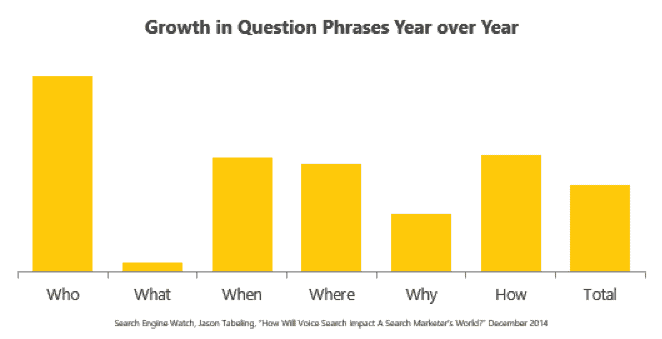Here at Zen Media, members of our team are always aware of the search marketing behind a campaign. Whenever we do work for a client, each team—social, content, and client relations—knows about search marketing and keeps it in mind. Why? Well, because we’ve got a kick-butt search team. But even more importantly, because they’ve taught us that every piece of content we publish on behalf of a client can improve their search engine optimization.
Up until recently, we’ve worked around our knowledge of text-search, and many marketers have. But it’s time to step into the future because SEO is changing. More prevalent than ever is voice search and in order to improve our search marketing efforts, we need to know more. In this article, we’ll tell you what we know and factors to consider alongside voice search for the best optimization.
What is Voice Search? The Basics
Voice Search is the ability for users to speak into a microphone to perform their search, rather than type what they’re looking for into their mobile device or web browser. Many are familiar with Apple’s Siri, Google Voice, and Microsoft’s Cortana, which allow consumers to search in this manner. Voice search gained much of its popularity through Apple’s Siri and in the past year has grown substantially. According to Google, 55% of teens use voice search on a daily basis.
You may not know what I’m talking about right off hand until you actively use voice search. It looks like this:
How is Voice Search Different from Text Search?
Gotcha! That’s a trick question. Voice search and text search aren’t different at all. Google and other search engines still return the same results for voice search as they do for text search; the difference here is how a user searches. Voice search is making it easier for us to be lazier. But it’s also making us more efficient.
Where we used to have to open our mobile browser to type in a search, we can now ask our phone’s voice search program or speak into our phone or web browser. We don’t even need to really lift a finger. And since Google stores a lot of our personal information, we don’t have to limit our searches to the World Wide Web but can also search our own information. You can search your calendar events, or notes you’ve made on your phone. There really are no limits. And since Google has a kick-butt learning algorithm, your voice search learns about your habits in the same way your text search does.
How Do Marketers Adapt for Voice Search?
As marketers, we ourselves have the ability to put ourselves in the user’s shoes when it comes to thinking about voice search. Here are some steps we can take to adapt to how users are voice searching to better optimize our content:
1.) Think of questions when you’re writing your content.
Let’s go back to the era when we all learned to answer an essay question. Most teachers advised us to think of our answers in terms of the 5 W’s: “Who,” “What,” “When,” “Where,” and “Why?” And of course, let’s not forget about “How?” This is how users are now using voice search—they are asking a question. Of course, they often use text search the same way, but look at this graph below, from Search Engine Watch that shows how these questions have increased on voice search over the past year. Maybe it’s because it’s easier to ask your mobile device or browser a question then to type it in, but whatever the reason—these sort of searches are increasing rapidly. Imagine what we’ll find by the end of 2015!
Photo credit: Search Engine Watch
2.) Don’t Forget to Use Your Keywords
Voice search isn’t changing how relevant keywords are to SEO. Sure, users are searching a bit differently, but the same keywords and keyword phrases are being used to conduct a search—so be sure you’re still using them. And just like with text search, you want to make sure you’re incorporating semantic search also.
3.) Put it into Practice
We hope that when you’re optimizing your content for SEO, you’re using Google Search to test out how things work. What is the suggested search that Google pulls up for your keywords? Do the same with voice search. When you’re done creating content, go through and find the keywords and phrases you used and actually test the outcome with voice search.
Remember to Act Natural
When Google releases new search algorithms, it can be daunting enough. But, as marketers, we adjust. We’ll do the same with voice search. Don’t be intimidated! It’s not so different from text search, after all. Here at Zen Media, we’re looking forward to observing how the trend of voice search changes our roles as marketers. If in doubt while adjusting yourself—remember that your audience is human, too. If ever you become overwhelmed when optimizing a new campaign, put yourself in the user’s shoes and consider how they would act.
Have more questions about voice search? We’d love to hear them and know how you’re adjusting to best optimize your campaigns. Feel free to reach out to us here on the Zen Media blog or contact us directly to talk shop on best practices.









